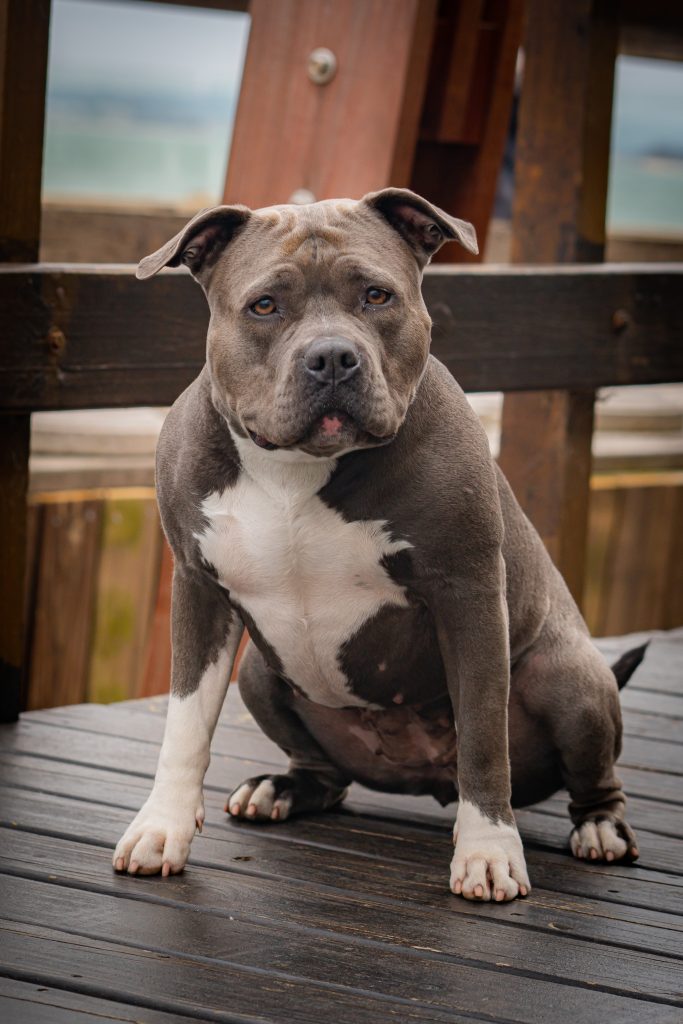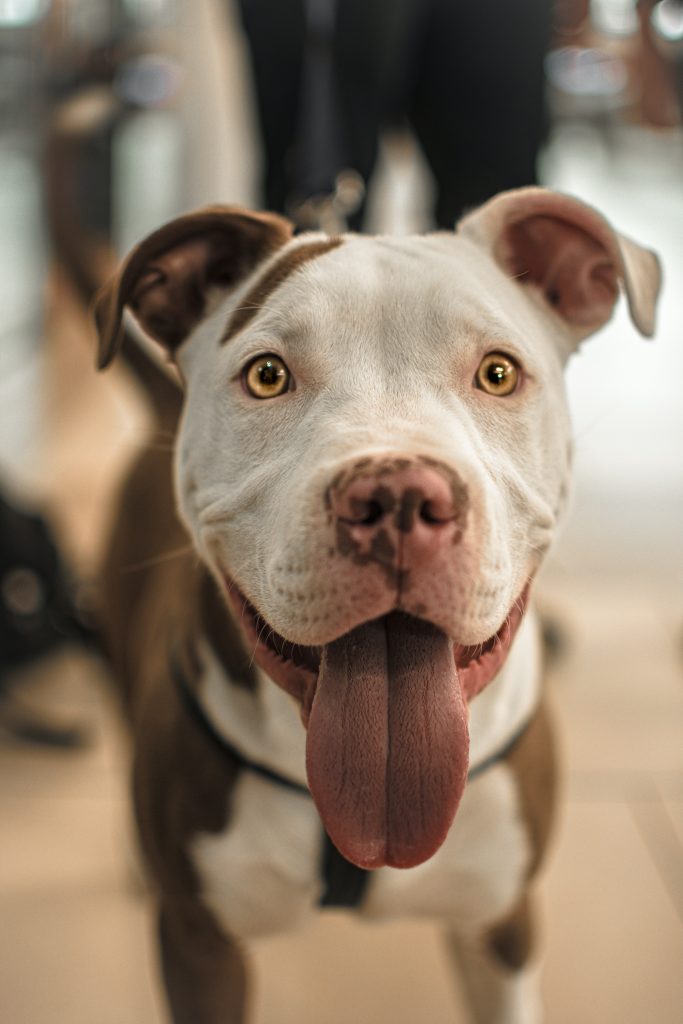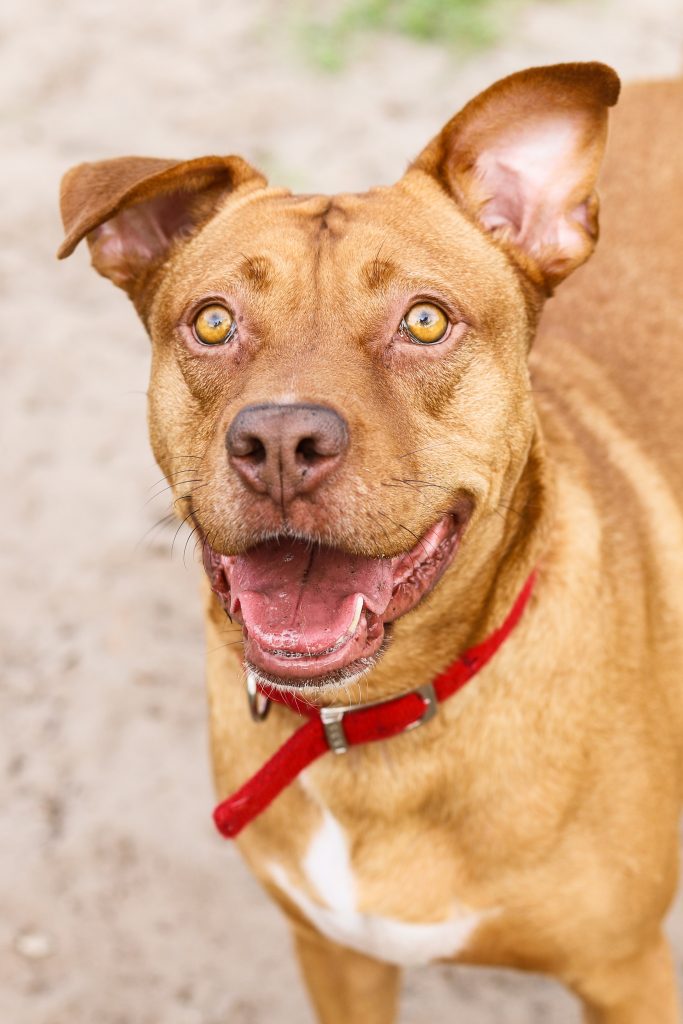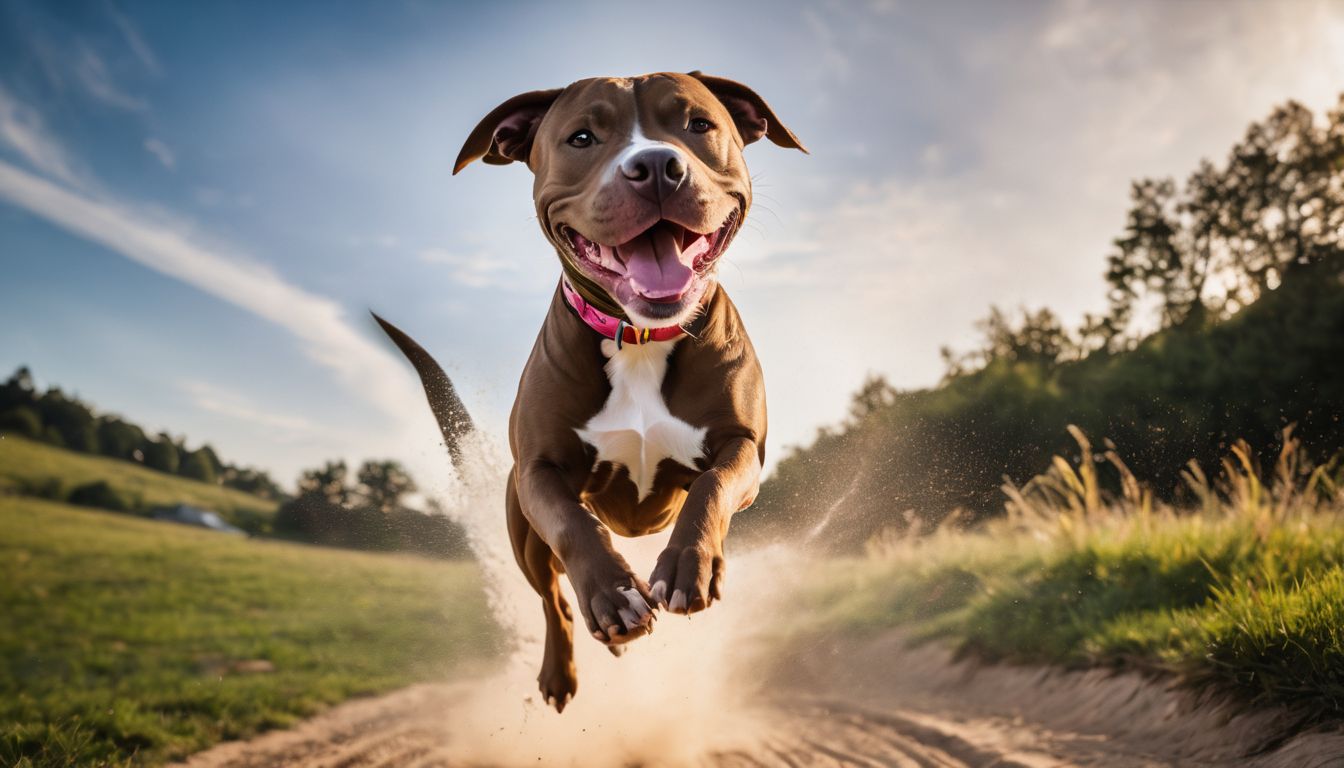Are you curious about how long does a pitbull live and factors that can influence their lifespan? Pit Bulls, on average, have a life expectancy of 8 to 15 years. This article delves into the details of pit bull lifespans and provides useful tips on how to help extend your furry friend’s life.
Find out how you can contribute to your loyal companion’s thriving longevity by reading on!

Key Takeaways
- The average lifespan of a pit bull is 8 to 15 years.
- Pit bull breeds have varying lifespans, with American Staffordshire Terriers living for 12 to 16 years and American Pit Bull Terriers and Staffordshire Bull Terriers living for 8 to 15 years.
- Factors that can impact a pit bull’s lifespan include their breed, underlying health issues, spaying or neutering, exercise and diet, and environmental factors.
- Common causes of death for pit bulls include trauma, cancer, gastric dilatation volvulus (bloat), and skin disease.
Pit Bull Lifespan and Factors That Impact It
Different pit bull breeds have varying lifespans, and several factors can impact their overall lifespan, including underlying health issues, spaying and neutering, exercise and diet, as well as environmental factors.
Pit bull lifespan by breed
Pitbulls are a diverse breed with varying lifespans due to their mixed lineage. The breed of a pit bull can heavily impact its expected lifespan.
| Breed | Average Lifespan |
|---|---|
| American Staffordshire Terrier | 12 to 16 years |
| American Pit Bull Terrier | 8 to 15 years |
| Staffordshire Bull Terrier | 8 to 15 years |
As we can see from the table, the average lifespan of a pit bull varies depending on the specific crossbreed. It’s crucial for owners to know their pitbull’s specific breed to better understand and cater to their pet’s lifespan needs.
Factors that impact pit bull lifespan
There are several factors that can impact the lifespan of a pit bull:
- Breed: The specific crossbreed of a pit bull can influence how long they live.
- Health issues: Underlying health problems can affect a pit bull’s lifespan.
- Spaying and neutering: Getting your pit bull fixed can have an impact on their life expectancy.
- Exercise and diet: Providing proper exercise and a balanced diet is important for their overall health and longevity.
- Environmental factors: The environment in which a pit bull lives, including living conditions and exposure to toxins, can impact their lifespan.
Underlying health issues
Pit bulls, like any other dogs, can have underlying health issues that may affect their lifespan. These health issues can vary among individual pit bulls and their specific breeds.
Some common underlying health issues in pit bulls include hip dysplasia, heart disease, allergies, and certain types of cancers. It is important for dog owners to be aware of these potential health concerns and take proper care of their pit bulls to minimize the impact on their lifespan.
Regular veterinary check-ups, a balanced diet, regular exercise, and providing a safe environment are all important factors in ensuring the overall health and longevity of your beloved pet.
Spaying and neutering
Spaying and neutering your pit bull can have a positive impact on their lifespan. By spaying or neutering your dog, you can prevent certain health issues that may arise in the future.
These procedures help to reduce the risk of uterine infections, testicular cancer, and other reproductive diseases. Spayed females are less likely to develop breast tumors as well.
In addition to the health benefits, spaying or neutering your pit bull can also help control their behavior and reduce aggression and roaming tendencies. It is recommended to discuss the timing of these procedures with your veterinarian to ensure optimal results for your pit bull’s overall health and wellbeing throughout their lifespan.
Exercise and diet
To keep your pit bull healthy and extend their lifespan, it’s important to provide them with regular exercise and a balanced diet. Here are some tips:
- Daily Exercise: Make sure your pit bull gets plenty of exercise every day. Take them for walks, play fetch, or let them run around in a secure backyard. Aim for at least 30 minutes to one hour of exercise daily.
- Mental Stimulation: Along with physical exercise, engage your pit bull’s mind with puzzle toys or training sessions. This helps keep them mentally sharp and prevents boredom.
- Balanced Diet: Feed your pit bull a high-quality, balanced diet that meets their nutritional needs. Consult with your veterinarian to determine the right amount and type of food for your dog’s age, size, and activity level.
- Portion Control: Avoid overfeeding your pit bull as obesity can lead to health issues and shorten their lifespan. Follow feeding guidelines provided by the food manufacturer or ask your vet for advice on portion control.
- Fresh Water: Always provide clean and fresh water for your pit bull to drink throughout the day. Hydration is essential for overall health and well-being.
- Monitor Weight: Keep an eye on your pit bull’s weight regularly. If you notice significant weight gain or loss, consult with your vet to rule out any underlying health issues.
Environmental factors
The environment plays an important role in a pit bull’s lifespan. Factors such as their living conditions, exposure to harmful substances, and access to proper shelter can all impact how long they live.
Providing a safe and clean living space for your pit bull is crucial in ensuring their well-being. This includes having a secure backyard or fenced area where they can run and play safely, as well as providing them with proper shelter from extreme weather conditions.
It’s also important to make sure that your pit bull is not exposed to toxic substances or hazardous materials that could negatively affect their health. By creating a healthy and supportive environment for your pit bull, you can help extend their lifespan and ensure that they thrive for years to come.

Common Causes of Death for Pit Bulls
Pit bulls commonly succumb to various causes of death, including trauma, cancer, gastric dilatation volvulus, and skin disease.
Trauma
Trauma can be a common cause of death for pit bulls. They are active and energetic dogs, which means they may be more prone to accidents and injuries. Traumatic incidents like car accidents, falls, or physical altercations with other animals can have severe consequences for their health.
It’s important to keep a close eye on your pit bull and take precautions to prevent any dangerous situations that could lead to trauma. Regular vet check-ups and keeping them in a safe environment can also help reduce the risk of injury.
Cancer
Cancer is one of the common causes of death for pit bulls. Just like humans, dogs can develop different types of cancer, such as lymphoma, mast cell tumors, and bone cancer. These cancers can affect various parts of their body and may spread to other organs as well.
Unfortunately, cancer can be difficult to detect in its early stages because dogs cannot tell us when they are feeling unwell. That’s why it’s important to keep an eye out for any changes in your pit bull’s behavior or appearance and take them to the vet regularly for check-ups.
Gastric dilatation volvulus
Gastric dilatation volvulus, also known as GDV or bloat, is a serious condition that can affect pit bulls. It happens when the stomach fills up with gas and twists on itself. This can be very painful for your dog and can lead to life-threatening complications if not treated quickly.
Signs of gastric dilatation volvulus include a swollen belly, restlessness, excessive drooling, trying to vomit but nothing comes out, and difficulty breathing. If you notice any of these symptoms in your pit bull, it’s important to seek veterinary care immediately.
GDV is more common in deep-chested breeds like pit bulls. Factors like eating too quickly, exercising after meals, or having a close relative with GDV may increase the risk. To help prevent this condition in your pit bull, you can feed smaller meals throughout the day instead of one large meal and ensure they have time to rest after eating.
Skin disease
Skin disease is a common issue that can affect pit bulls and impact their lifespan. Skin problems can be caused by various factors, such as allergies, parasites, infections, or even genetic conditions.
Itchy skin, redness, rashes, hair loss, and sores are some of the signs of skin disease in pit bulls. Regular grooming and proper hygiene can help prevent these issues. If your pit bull shows any signs of skin disease, it’s important to consult with a veterinarian for proper diagnosis and treatment to ensure your furry friend stays healthy and happy.

How to Extend Your Pit Bull’s Lifespan
To extend your Pit Bull’s lifespan, provide proper care and attention, schedule regular vet check-ups and vaccinations, maintain a balanced diet and exercise routine, and be mindful of avoiding dangerous situations.
Providing proper care and attention
To ensure your pit bull thrives and lives a long, healthy life, it’s important to provide them with proper care and attention. Here are some key ways to do so:
- Regular visits to the vet for check – ups and vaccinations.
- Feeding them a balanced diet that meets their nutritional needs.
- Giving them plenty of exercise to keep them physically fit.
- Providing mental stimulation through interactive toys and training sessions.
- Ensuring they have access to clean water at all times.
- Grooming them regularly to keep their coat clean and free from mats.
- Giving them lots of love, attention, and positive reinforcement.
- Creating a safe and secure environment for them both indoors and outdoors.
Regular vet check-ups and vaccinations
To keep your pit bull healthy and extend their lifespan, it’s important to schedule regular vet check-ups and ensure they receive their vaccinations on time. Your dog’s veterinarian can provide guidance on the necessary vaccines and when they should be administered. Regular check-ups allow the vet to monitor your pit bull’s health, catch any potential issues early, and provide appropriate treatment. Vaccinations protect your dog from common diseases and illnesses that can seriously impact their quality of life. Make sure to follow your vet’s recommended schedule for vaccinations to keep your pit bull protected.
Balanced diet and exercise
To keep your pit bull healthy and extend their lifespan, it’s important to provide them with a balanced diet and regular exercise. Here are some tips to help you achieve this:
- Feed your pit bull high – quality dog food that meets their nutritional needs. Avoid giving them excessive treats or human food, as this can lead to obesity and health problems.
- Consult with your veterinarian to determine the appropriate portion size for your pit bull based on their age, weight, and activity level.
- Make sure your pit bull gets regular exercise. Take them for daily walks, play fetch, or engage in activities that stimulate both their body and mind.
- Consider providing interactive toys or puzzle feeders to keep your pit bull mentally stimulated while they eat.
- Monitor your pit bull’s weight and body condition regularly. If they become overweight, adjust their diet and increase their exercise accordingly.
Avoiding dangerous situations
To help extend your pit bull’s lifespan, it’s important to avoid putting them in dangerous situations. This means keeping them away from aggressive dogs or unfamiliar animals that could potentially harm them.
It also means supervising their interactions with children and making sure they are always treated gently. Additionally, it’s crucial to keep your pit bull on a leash when outside and secure any fences or gates to prevent them from escaping and getting into accidents.
By being aware of potential dangers and taking the necessary precautions, you can help ensure your pit bull stays safe and lives a long, healthy life.

Conclusion
Pit bulls can live for an average of 8 to 15 years, depending on their breed. Factors like health issues, spaying or neutering, exercise and diet, and the environment can impact their lifespan.
It’s important to provide proper care, regular check-ups, balanced diet and exercise, and keep them away from dangerous situations to extend their lifespan. By taking these steps, you can ensure that your pit bull thrives for as long as possible.
FAQs
1. What is the average lifespan of a pit bull?
The average life expectancy of a pit bull, which is an American dog breed, can vary but it typically ranges from 8 to 15 years.
2. Do all pit bulls live the same amount of time?
No, the lifespan variation in this breed results from factors like health and care. Pitbull health and longevity also depends on genetic factors.
3. Are there ways to help my pit bull live longer?
Yes! Proper care plays a key role in the lifespan of any pet, including affectionate dogs like pit bulls.
4. What makes a pit bull’s life span different from other breeds?
Every breed has specific traits that affect its longevity; for instance, the exercise needs and diet specifics for loyal companions like pit bulls may differ from other breeds.
5. Can you explain how we convert Pitbull’s age into human years?
Each dog year equals about seven human years; so if your courageous petpitbull is ten years old, it would roughly be equivalent to seventy in human age..
6.Does being an often-stereotyped vicious breed affect the Pitbull’s Lifespan/Longevity?
While stereotypes could lead to stress or limited social interaction for pets like these family dogs,pit bulls are generally known for their courage and energy regardless.Any impact on their lifespans isn’t confirmed by research yet.


